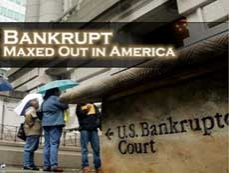 Hard times, easy credit and the era of predatory lenders.
Hard times, easy credit and the era of predatory lenders.
by James Scurlock
The federal government — and the majority of Americans — can no longer get by a single day without taking on additional debt. And as more borrowing goes to simply pay off old debt, or to make interest payments, the new debt does little more than increase banking profits.
Eventually the higher levels of debt will lead to higher interest rates, which will lead to more debt, creating a cycle as vicious as it is inevitable. Over the past generation, banks and credit card companies have made trillions of dollars of high-interest, unsecured debt available, and Americans have scooped it up. Our incomes have risen an average of 1 percent in real terms, while our household debt has increased over 1,000 percent. As a result, we no longer save. We have no choice but to keep spending until our credit is exhausted and we own nothing…
As Marriner Eccles, the legendary Fed chairman during the Great Depression, noted, "The economy is like a poker game where only a few people control the chips and the other fellows must borrow to stay in the game. But the moment the borrowing stops, the game is over."
How did we allow this to happen? How could we be so shortsighted? How could banks keep lending to people who can't afford to pay them back? Doesn't that fly in the face of tradition, if not common sense? Don't bank executives realize that they are sowing the seeds of their own destruction? After all, when most Americans can no longer stay afloat, the banks will sink alongside them as they did back in Marriner Eccles' day.
The simple answer is that while the banking industry has gone through its most profound change since the Venetians invented modern finance hundreds of years ago, Americans have clung to old assumptions. In particular, we've continued to believe that banks wouldn't extend us credit unless we could handle it, and that banks want us to save. Yet, the big banks realized more than a generation ago that they make far more money teaching us to spend than to save. They've also learned that making money upfront, mostly in the form of fees, is a lot more fun than waiting for a revenue stream to trickle in. The reason is simple: Fees can be booked as profits immediately; revenue streams take years. This is why most mortgages, car loans, and even credit card receivables are bundled together and sold off, sometimes instantly, to Wall Street.
Take Enron as an example. Enron executives didn't want to wait for their brilliant ideas to bear fruit. So, with the help of an accounting firm called Arthur Andersen, and the blessing of the S.E.C., they applied a short-term accounting rule called "mark-to-market" to long-term contracts, so that executives could decide how much a new business idea was worth, book it as immediate profit, and then collect a bonus on that profit — all in the same quarter. When these new businesses instead generated huge losses, executives turned to the world's largest banks to hide those losses — for a fee. Enron would "sell" the losses to a large bank before reporting its financial results, then buy them back afterward at a greater loss. The bank collected a fee without taking a risk, the bankers got a bonus based on generating that fee, and, most important, the Enron execs rewarded themselves with huge bonuses based on phony — but consistently growing — profits. Of course, mark-to-market guaranteed Enron's eventual failure. But consider that the top ten CEOs in America now earn more than $100 million per year, and you realize how quickly short-term gimmicks can create vast fortunes.
The same gimmicks are now being applied to consumer debt. Most mortgages, car loans, and credit card debt are packaged and sold off to investors at a profit within a short period of time, sometimes seconds. Banks create an estimate of how much the credit card debt is worth and sell it to investors, pocketing a profit. Ironically, mark-to-market was developed to prevent companies from hiding losses by compelling them to adjust their portfolios to market prices on a daily basis.
But there is an even greater misconception at work — a misconception that debt is not what it used to be. That there is "good" debt, for example, and "bad" debt. Tune in to Suze Orman, for example, and she will tell you that a single number, your credit score, is the key to your financial future. But while a good credit score gets you better rates on your mortgage and credit cards, it also opens up the floodgates for more "good" — i.e., cheap — credit to pour into your life, and this credit does not usually remain good or cheap for too long. The idea that one should stay out of debt, period, is now considered unrealistic. After all, who lives without debt? The Unabomber, maybe?
Even more frightening is the notion that debt is our friend — a magical tool that allows us, in the words of Napster's new ads, to "own nothing, have everything." No less a fiscal conservative than President Bush has dismissed the federal debt as "numbers on paper." His vice president has flatly stated, "Deficits don't matter." But the apathy prize goes to two-term Florida Sen. Connie Mack, who was hired to give Bush ideas on reforming the tax code in 2005. Here's a recent exchange between the senator and the New York Times:
Interviewer: Where do you suggest we get the money from? Sen. Mack: What money?
Interviewer: The money to run this country. Sen. Mack: We'll borrow it.
Interviewer: I never understand where this money comes from. When the president says we need another $200 billion for Katrina repairs, does he just go and borrow it from the Saudis? Sen. Mack: In a sense, we do. Maybe the Chinese.
Twenty years ago, when the federal debt passed the trillion dollar mark, politicians, including Ronald Reagan, as well as economists, including Alan Greenspan, warned of dire consequences. Seven trillion dollars later, borrowing more has become the solution to every conceivable problem. Take Social Security as the largest, and perhaps most insidious, example: In order to reduce deficits, the past four presidents have borrowed $1.5 trillion from Social Security and the "trust fund" now holds nothing more than a very big IOU. In effect, we've been surfing, borrowing from Social Security to pay off the interest on the federal debt every year. In the 2000 and 2004 elections, George W. Bush promoted an idea called "private accounts." In theory, every American would own their Social Security account. The account would contain real money so it could buy real investments, i.e., not IOUs. In theory one could also borrow against it, of course. The trouble is that since the Social Security Trust Fund has no cash, no one can say where the money would come from to fund these accounts. The Chinese again? Probably. But Bush hasn't told us yet. He has, however, loudly warned working Americans not to count on Social Security.
The media never really took the president to task on the math of private accounts. It was the AARP that killed the idea, and, ironically enough, they hated it because private accounts would have reduced the amount of guaranteed benefits to their members, not because it would have indebted their future members. Pete Peterson, one of the smartest financiers among us, has correctly pointed out that "benefits" like personal accounts are simply deferred taxes if they're not paid for. Yet neither the anti-tax president nor his adversaries once questioned whether borrowing the trillions of dollars needed to fund private accounts was a good idea, much less possible. After all, Americans have accepted the surfing lifestyle in all of its absurdities. We have watched advertisements that say, "Pay off your high credit card debts!" and we have called the 800 numbers and attached our homes to new loans in order to pay off our credit cards, then bragged to our friends that we are "debt free." We are encouraged to rent things we used to own — including music and, paradoxically, the down payments on our homes. We have accepted this new bargain that we will never be out of debt as inevitable, preordained by the God of our choosing. We have forgotten the feeling of solid ground as we have taken on larger and more treacherous waves. We have ignored the greatest investor among us, Warren Buffett, who has derided our "sharecroppers society." He sounds old, cranky, and un-hip.
Until we wipe out. Until we lose our jobs, until we get divorced, until we discover that our health insurance doesn't cover thousands of dollars of "extras," until we lose our job or until our home doesn't appreciate at the anticipated rate. Until we can no longer surf. And then the "debt hell," as a consumer advocate I interviewed calls it, kicks in. The fees pile up. The interest rates increase. The bargain we accepted ceases to be a bargain. It becomes prohibitively expensive. We learn that we are not middle class at all. We are poor. We own nothing. And then, just maybe, we finally ask, "Well, how did we get here?"
ATTENTION READERS
We See The World From All Sides and Want YOU To Be Fully InformedIn fact, intentional disinformation is a disgraceful scourge in media today. So to assuage any possible errant incorrect information posted herein, we strongly encourage you to seek corroboration from other non-VT sources before forming an educated opinion.
About VT - Policies & Disclosures - Comment Policy




